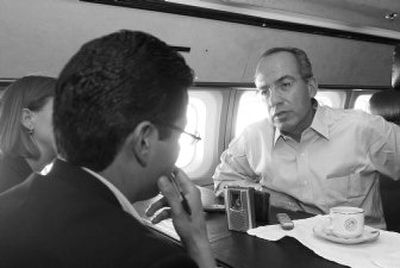Calderon flies high in polls

MEXICO CITY – President Felipe Calderon had to outsmart legislative opponents just to physically enter Congress and take the oath of office after last year’s razor-close election. Now, 100 days later, he’s flying high in the polls and doing surprisingly well even with those who say the vote was fraudulent.
Recent polls by Mexico’s largest national newspapers, Reforma and El Universal, both put Calderon’s approval rating at 58 percent. That’s not bad for a candidate who barely garnered 35 percent of the vote and won by just half a percentage point.
“In the popular perception of his figure and his rule, Calderon just clears the bar, but if we remember the great rejection that our actual president experienced in the days prior to his inauguration, then we can see that in 100 days he has accomplished a lot,” wrote German Dehesa, a newspaper columnist and radio commentator.
Washington has been particularly pleased. Prior to President Bush’s meeting with Calderon in Yucatan this week, a stream of U.S. Cabinet secretaries has visited the Mexican capital to praise booming trade and the extradition of drug lords.
Based on poll responses, Calderon’s biggest success to date is a military-led crackdown against drug trafficking in major cities that had spun out of control in recent years. They include the Pacific Coast beach resort of Acapulco, which is preparing for Spring Break, and Nuevo Laredo on the border with Texas.
On Saturday, Calderon said that drug traffickers’ threats against his government would not stop the military crackdown against them, and he demanded that the United States do more to fight the sale and consumption of drugs domestically.
In an interview with the Associated Press aboard his presidential plane, Calderon said he would push President Bush to respect migrant rights and do more against drugs in the U.S. when the two meet on Tuesday in the colonial city of Merida, Mexico.
“We are, at the end of the day, putting our lives on the line in this battle, and the United States has to come up with something that is more than symbolic gestures, much more,” Calderon said. “Mexico can’t diminish the availability of drugs while the U.S. hasn’t reduced its demand. It’s an elemental equation.”
But his focus on public safety is only part of the equation. Calderon sold himself as the “jobs president” midway into his campaign last year.
Here is a look at how Calderon has fared on major issues during his first 100 days in office:
Public security
Not so long ago, Mexicans used to look at the level of gang violence and gun crimes in the United States with horror. Now they are living it. Calderon’s first major action as president was to send thousands of troops and federal police into the central state of Michoacan, where brutal killings and beheadings had become almost a daily affair as part of a drug turf war.
Drugs and guns were seized and some alleged traffickers arrested, and the formula was repeated in additional cities and states. Critics say the actions are more sizzle than steak, with no arrests of major drug kingpins, and violence continuing under the noses of the very soldiers and police sent in to stop it.
But Mexicans are generally supportive. The Reforma poll shows that 59 percent of those surveyed said Mr. Calderon was doing a “very good” or “good” job in the drug fight.
Calderon also announced a 46 percent pay raise for military personnel.
Economy
Calderon’s first crisis after his inauguration was the tortilla crisis. The staple of the Mexican diet had been rising in price long before the new president took office Dec. 1, but the increases accelerated during the holidays and January. Calderon persuaded producers and retailers to hold the price at a maximum of 8.50 pesos (about 75 cents) for a kilogram (2.2 pounds), and the controversy quickly subsided.
But the “jobs president” appears to be failing in the area he stressed most heartily in his campaign. January unemployment rose to nearly 4 percent, up from 3.5 percent a year ago. That number sounds low because in Mexico people are considered employed if they are at least 14 years old and have worked even an hour a week, both in the formal and in the booming informal economy.
Mexicans complain mostly about underemployment and poor salaries, which drives many to migrate illegally to the United States.
Poverty, social programs
Calderon said he was going to pass his foes “on the left” by making the fight against poverty his own. His chief opponent, former Mexico City Mayor Andres Manuel Lopez Obrador, had long used the slogan “the poor come first.”
After launching the anti-drug fight, Calderon turned his attention to a series of social programs making health care available to every Mexican, providing 150,000 temporary jobs this year, extending tax incentives to encourage businesses to hire the elderly and disabled, and launching a series of development projects as part of his “100 actions in 100 days” promise. He also launched a school safety program.
The health care component has been applauded by most Mexicans in opinion polls, but the polls also show that a minority of Mexicans believe that Calderon is doing a good job on anti-poverty efforts in general. And the El Universal/Ipsos-Bimsa poll shows that only 9 percent of Mexicans believe the new president is favoring the poor, although 43 percent said he was favoring “all Mexicans.” Forty-one percent said he was favoring the rich.
Some critics say the greatest anti-poverty program would be to introduce greater competition into the economy by breaking up monopolies.